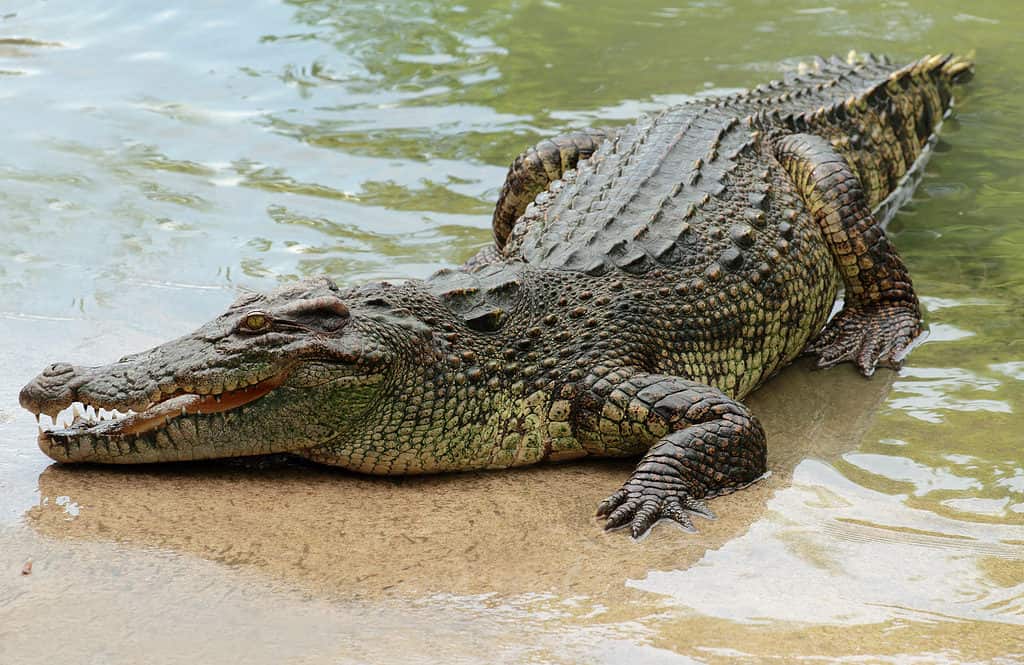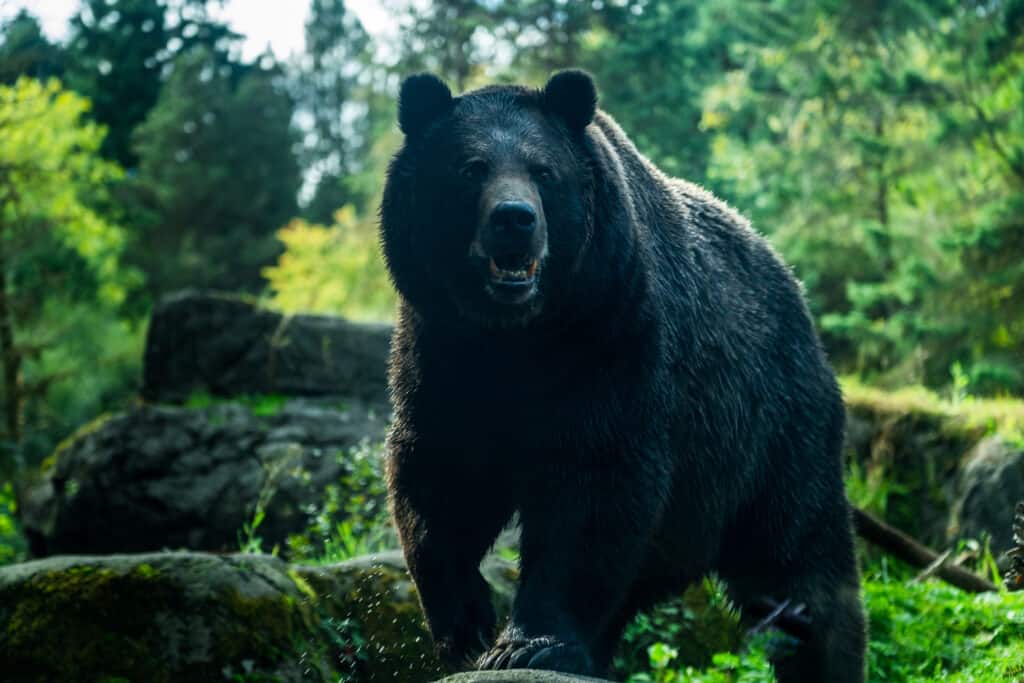Many nocturnal creatures lurk around neighborhoods, such as the fox and raccoon. These two mammals often stay close to human-populated areas because of the high chance that they can snatch some food. What happens if these two animals meet and decide that they don’t want the other encroaching on their territory? We’re going to look at a fox vs raccoon fight and show you which of these creatures is most likely to survive such an encounter! Come learn how this fierce bout would end in the wild!
Comparing a Fox and a Raccoon

| Fox | Raccoon | |
| Size | Weight: 11lbs-31lbs Height: 8in-20in Length: 16in-33in | Weight: 7lbs-20lbs Height: 9in-12in Length: 16in-28in, up to 40in with tail |
| Speed and Movement Type | 30- 40 mph | – 15 mph |
| Senses | – Powerful sense of smell – Good sense of vision over short distances, but they are somewhat colorblind like dogs. – High sense of hearing that far exceeds human levels | – Very strong hearing – High intelligence – Powerful sense of smell – Good night vision but poor long-distance vision and bad color vision |
| Defenses | – May climb trees to escape foes – Great senses help them recognize impending danger – Uses their high intelligence to know when it’s time to run and when to fight | – Ability to climb trees with ease – Threat display of bluff charging |
| Offensive Capabilities | – Total of 42 teeth – Long, strong pair of incisors that can deeply penetrate enemies. | – Claws sensitive areas like the eyes – Bites several times with long incisors that can deliver deep puncture wounds – Raccoons mangle foes instead of going for a single killing blow. |
| Predatory Behavior | – Ambush predators that prefer to attack under the cover of darkness – Stalk prey and then attack when they have the advantage | – Opportunistic predators that find food in their environment and then strike |
What Are Key Differences Between a Fox and a Raccoon?

Gray foxes are larger than most raccoons.
©iStock.com/johnpane
The main differences between a fox and a raccoon lie in their size, speed, and predatory behaviors. Foxes are larger than raccoons, weighing more and growing taller than them.
Foxes are also far faster than raccoons. For example, the gray fox can run upwards of 40 mph, but raccoons can only scurry at about 15 mph. Also, foxes are ambush predators, but raccoons are opportunistic predators that are less deliberate in finding their prey.
These key differences between raccoons and foxes are important for distinguishing the creatures, and they also grant insight into how a fight between them would pan out.
What Are the Key Factors in a Fight Between a Fox and a Raccoon?

Offensive power, speed, and size are key factors in a fox vs raccoon fight.
©dangdumrong/Shutterstock.com
Determining the winner of a battle between a fox and raccoon requires examining several factors such as size, speed, and combat skills. Each of those elements impacts the battle because one animal will have certain advantages over the other. Having enough of those advantages ultimately determines which animal has the right combination of skills and physical traits to dominate the other.
Fox vs Raccoon: Size
Foxes are larger than raccoons in every dimension. Foxes can weigh up to 31lbs, grow 20 inches in height, and 33 inches in length, not counting their tails. Raccoons top out at 20lbs, 12in tall, and 28in long without their tails. In this fight, foxes will use that extra weight to their advantage, making sure they pin their foe and prevent them from escaping.
Foxes have the advantage in terms of their size.
Fox vs Raccoon: Speed and Movement
Foxes are faster than raccoons. A fox can run at a speed of 30 mph on average, but some foxes are even faster. For example, the gray fox can reach a maximum speed of 40 mph. That is far faster than raccoons since they can only reach a speed of 15 mph.
Foxes would be the ones determining when the fight starts and if either it or the raccoon gets to run away.
Foxes have the advantage in terms of speed.
Fox vs Raccoon: Senses
Foxes and raccoons have very similar levels of smell, hearing, and vision. They are both even partially colorblind, but the raccoon is completely colorblind. Also, the fox can distinguish some colors in the same way that dogs can.
The two animals’ senses are so similar that we’re going to call this section a tie.
Fox vs Raccoon: Physical Defenses
Foxes can run from enemies with their high speed, climb trees to get away from danger, and use their intelligence to tell them whether to flee or fight. Raccoons are similar in the sense that they can climb trees to escape foes. However, they are not speedy like the fox.
Foxes have better physical defenses than raccoons, and they have the advantage in this situation.
Fox vs Raccoon: Combat Skills
Foxes are ambush predators that stalk their prey and attack when the time is right. They will often sprint at their prey, smash into them while trying to land a bite in their vital areas, often their necks. Their teeth are their greatest weapon, and they use them to great effect.
Raccoons may look fuzzy and sweet, but they’re completely different animals when it comes to a fight. They are opportunistic predators that maul their prey by clawing at their eyes and sensitive areas while inflicting deep, terrible bites on their foes.
Both animals are very capable fighters, so we’re going to call this part a tie as well.
Who Would Win in a Fight Between a Fox and a Raccoon?

A fox would win a fight against a raccoon.
©iStock.com/RT-Images
A fox would win a fight against a raccoon. Foxes are larger, faster, and stronger than the vast majority of raccoons that they would encounter. Furthermore, foxes are ambush predators that have large enough teeth to bite into their foes, crack bones, and do fatal damage.
Raccoons can rival foxes in size and viciousness in some cases, but they are not adept carnivore predators that are used to taking down animals their size.
The most likely outcome would see the fox stalking the raccoon and circling it, and then pouncing at the animal when the right moment arises. The battle would be bitter, but the fox would overpower the raccoon and deal fatal damage. The fox would not walk away unscathed unless it managed to kill the raccoon immediately, though.
What Other Animal Can Take Down a Fox?
Quite a few, it turns out.

American crocodiles are capable of exerting a bite force of 2,980 psi
©Naypong Studio/Shutterstock.com
American Crocodiles: These powerful reptilians are known to lie in wait, just beneath the surface, waiting and watching for their next mouthful of protein, to approach. In the event of a fox losing itself in the joy of a cooling drink, it would be no match for those lethal jaws capable of exerting a bite force of 2,980 psi which will subsequently drag it to the depths.

Black bears are capable of overpowering a fox owing to their greater size and bite force
©elena_prosvirova/Shutterstock.com
Black Bears: While a violent encounter between the two omnivores is highly unlikely — foxes are too prudent to take on one of these lumbering bruins — the smaller canid will certainly be no match for the larger ursine in a hypothetical bout. It would simply be outclassed thanks to a bite force of 800 psi and a weight of 300 lbs, not to mention sharp claws and fangs, as opposed to those slender jaws only capable of exerting 307 psi, far less than the force of a coyote (which can clamp down with a force of 727 psi).
The photo featured at the top of this post is © iStock.com/JMrocek
Thank you for reading! Have some feedback for us? Contact the AZ Animals editorial team.






